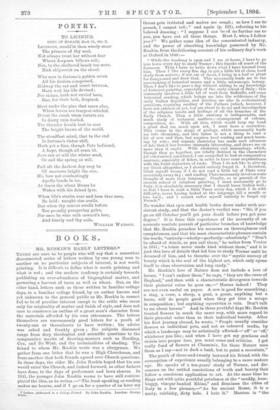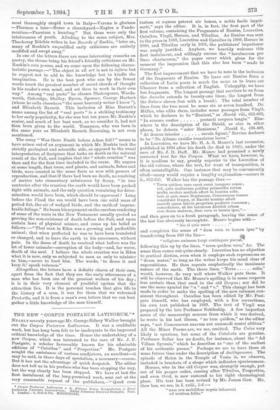BOOKS.
MR. RUSKIN'S EARLY LETTERS.*
THERE are sure to be people who will say that a somewhat disconnected series of letters written by one young man to another on no particular subjects of interest, is not worth printing. It is difficult to define what is worth printing and what is not ; and the modern tendency is certainly towards publishing an over-abundance of biographical matter, and garnering a harvest of tares as well as wheat. But, on the other hand, letters such as these written in familiar college days, to a familiar college friend, by an author known and yet unknown to the general public as Mr. Ruskin is, cannot fail to be of peculiar interest except to the critic who cares only for originality of matter and finish of style, and does not care to construct an outline of a great man's character from the materials afforded by his own utterances. The letters themselves are uncommonly good letters for a youth of twenty-one or thereabouts to have written ; his advice was asked and frankly given ; the subjects discussed range from deep theological and scientific questions to the comparative merits of drawing-masters such as Harding, Cox, and Do Wint, and the technicalities of shading. The friend to whom Mr. Ruskin wrote was a clergyman. We gather from one letter that he was a High Churchman, and from another that both friends agreed over Church questions. In those days, the elder Mr. John Ruskin hoped that his son would enter the Church, and looked forward, as other fathers have done, to the days of preferment and lawn sleeves. In 1841, the younger John Ruskin seems to have still contem- plated the idea, as he writes :—" The least speaking or reading makes me hoarse, and if I go on for a quarter of an hour my • Letters Addressed to a ColZege Friend. By John Raskin. London: George throat gets irritated and makes me cough ; so how I am to' preach, I cannot tell ; " and again (p. 121), referring to his• beloved drawing : " I suppose I can be of no further use to you, you have cut all these things. Must I, when} follow you P" We gather some idea of the concentrated industry, and the power of absorbing knowledge possessed by Mr... Ruskin, from the following account of his ordinary day's work at Oxford in 1840 :- " While the Academy is open and I am at home, I have to go into town every day to study Turner ; this knocks off much of the forenoon. Then I have to write down what I have learned from him. Then I like every fine day to get a little bit of close, hard study from nature ; if not out of doors, I bring in a leaf or plant for foreground and draw that. This necessarily leads me to the- ascertaining of botanical names and a little microscopic botany. Then I don't like to pass a day without adding to my knowledge of historical painting, especially of the early school of Italy ; this' commonly involves a little bit of work from Raffaelle, and some historical reading, which brings me into the wilderness of the early Italian Republics, and involves me also in ecclesiasticaL questions, requiring reading of the Fathers (which, however, I have not entered on yet, but am about to do so) and investigation of the religious tenets and feelings of all the branches of the Early Church. Then a little anatomy is indispensable, and much study of technical matters,—management of colours, composition, &c. With all this, which would keep my head, a great deal too much upon art, I must have a corrective. This comes in the shape of geology, which necessarily leads me into chemistry, and this latter is not a thing to read a• bit of now and then, but requires hard reading and much learn- ing by rote ; and organic chemistry has made such advances of late that it has become intensely interesting, and draws me on more than it ought. With chemistry and mineralogy, which, though they go together, are totally distinct in the characters (of substances) considered, I am compelled to look at comparative anatomy, especially of fishes, in order to have some acquaintance, with the fossil characters of rocks. Then I do not like to give up my Greek altogether, or I should entirely forget it. I, therefore, think myself wrong if I do not read a little bit of Plato very accurately every day ; and reading Plato necessarily involves some thought of more than language. Finally, as in pursuit of the ancient school of religious painting, I must necessarily go to Italy, it is absolutely necessary that I should know Italian well ; so that I have to read a little Tasso every day, which I do with. difficulty, never having looked at the language till a month or two back ; and I cannot suffer myself entirely to forget my Trench."
No wonder that eyes and health broke down under such per- sistent study, and that the doctor's verdict was : "Sir, if you go on till October you'll get your death before you get your degree." It is from this experience of the necessity of an accurate resolute pursuit of particular branches of knowledge- that Mr. Ruskin preaches his sermons on thoroughness and completeness, and that his most characteristic phrases contain the words, "entirely—wholly—perfectly—absolutely." "Don't be afraid of details, as you call them," he writes from Venice in 1841; " a letter never reads kind without them," and it is- just this love of details that led him to study Turner until he dreamed of him, and to theorise over the " mystic secrecy of beauty which is the seal of the highest art, which only opens. itself to close observation and long study."
Mr. Ruskin's love of Nature does not include a love of horses. " I can't endure them," he says, " they are the curse of England," and then with a characteristic divergence towards.
their pictorial value he goes on,—" Horses indeed They are not even useful on paper. A cow is good for something; a stag, a crow, a sheep, a goat, a goose, anything but a. horse, will do people good when they get into a scrape in composition ; but anything equestrian is ruin. Don't talk to me about horses." And in those youthful days Mr. Ruskin treated flowers in much the same way, with more regard to their pictorial value than to their individual beauty. After his first journey abroad, he wrote, " People usually consider flowers as individual pets, and not as coloured media, by which a landscape may be artistically affected—' aff ' or eff,' whichever you like; and when I have got my gentians and violets into proper tone, you must come and criticise. I get really fond of flowers at Chamonix, for there Nature noes them as I say—not to deck a bank, but to paint a mountain."
The youth of three-and-twenty lectured his friend with the assumption of experience usually belonging to a more mature age. Ho speaks of a ten-years' study of Turner, and dis- courses on the settled convictions of truth and beauty that- follow a consistent application to art. At the same time he flings out with quite youthful petulance at the " muddy, hum- buggy, vinegar-banked Rhine," and dismisses the cities of Italy in a few phrases,—" As for ancient Rome, it is a nasty, rubbishy, dirty hole. I hate it." Mantua? is " the most thoroughly stupid town in Italy—Verona is glorious —Florence a bore—Rome a churchyard—Naples a Pande- monium—Paaastum a humbug." But these were only the intolerances of youth. Alluding to the same subject, Mrs. Thackeray Ritchie writes in her Records of Ruskin, "later on, many of Ruskin's unqualified early criticisms are entirely modified and swept away." In one of the letters there are some interesting remarks on poetry, the theme being his friend's friendly criticisms on Mr. Ruskin's own poems, and we come upon the following charac- teristic passage :—" The object in all art is not to inform but to suggest, not to add to the knowledge but to kindle the imagination. He is the best poet who can by the fewest words touch the greatest number of secret chords of thought in his reader's own mind, and set them to work in their own way." Among "real poets" he classes Shakespeare, Words- worth, Coleridge, Shelley, Byron, Spenser, George Herbert (whom he calls elsewhere " the most heavenly writer I know "), and Elizabeth Barrett. This inclusion of Miss Barrett's name among the list of " real poets " is a striking testimony to her early popularity, for she was but ten years Mr. Ruskin's senior, and much of her best work, as we consider it, had not then been given to the world. Tennyson, who was born in the same year as Elizabeth Barrett Browning, is not even mentioned.
The essay " Was there Death before Adam fell P" seems to have arisen out of an argument in which Mr. Ruskin took the strictly geological and scientific side, as opposed to the usual interpretation of Scripture that looks on death as the natural result of the Fall, and implies that the " whole creation " was then and for the first time included in the curse. He argues at some length, that trees, and plants, and animals, fishes and birds, were created in the same form as now with powers of reproduction, and that if there had been no death, no resolving of matter into elementary substances by decay, " in two centuries after the creation the earth would have been packed tight with animals, and the only question remaining for deter- mination would have been, which should be uppermost ? Long before the Flood the sea would have been one solid mass of potted fish, the air of wedged birds, and the earth of impene- trable foliage." He bases his argument on the careless rendering of some of the texts in the New Testament usually quoted as proving the non-existence of death before the Fall, and upon certain laws of physical science, and sums up his belief as follows :—" That man in Eden was a growing and perfectible animal; that when perfected he was to have been translated or changed, and to leave the earth to his successors, without pain. In the doom of death he received what before was the lot of lower animals—corruption of the body—and, far worse, death of the soul. I believe the whole creation was in Eden what it is now, only so subjected to man as only to minister to him,—never to hurt him. The words, to dress it and keep it,' speak volumes."
Altogether, the letters have a definite charm of their own, apart from the fact that they are the early utterances of a man who has been one of the greatest writers of his day ; it is in their very element of youthful egoism that the attraction lies. It is the personal touches that give life to the history of a man, it was for them that we welcomed PrIeterita, and it is from a man's own letters that we can best gather a little knowledge of the man himself.



































 Previous page
Previous page